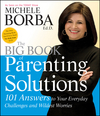Might you have a materialistic critter on your hands?
REALITY CHECK Beware: materialism is hitting our kids at younger and younger ages. Two-thirds of mothers say that their kids ask for specific brands before the age of three.
The Children’s Society, a charitable group in the UK dedicated to improving childhood, released scathing survey results that are none too flattering: A whopping eighty-nine percent of adults feel that today’s youth are far more materialistic and consumer-driven at much younger ages than previous generations. That survey also finds that kids most influenced by commercial pressures suffer more mental-health problems. But the problem is clearly not just in the UK.
Here are other troubling stats I discovered while researching The Big Book of Parenting Solutions:
- More U.S. kids than anywhere in the world believe that their clothes and brands describe who they are and define their social status.
- 95 percent of adults say their kids are too focused on buying and consuming things
- Two out of three parents surveyed said that their kids measure self-worth more by possessions that their parents did at the same age.
Of course raising kids in such materialistic world with advertisers taunting children to buy-buy-buy doesn’t make matters easier. But let’s face it, the biggest reason our kids are so darn materialistic is because we’ve allowed it. (Most of us anyway). We’ve obliged their every whim, bought them only the best name brands, and tried motivating to them “do good” by rewarding them with possessions. What’s more, we aren’t doing our kids any justice.
Research at the University of Minnesota shows the more materialistic the kid, the lower their self-esteem. All those clothes and electronics they own actually suppress their self-regard by sending the superficial message: “Your identity is what you have-not who you are.”
The first step to turning this attitude around is realizing you have one of these little critters on your hands. Here is a quick quiz from The Big Book of Parenting Solutions to help you determine if your child is going to the “dark side.”
A Five Word Review – Is Your Child Too Materialistic?
Here are the five words best describe materialistic kids. Think of your child’s typical daily actions, and then read the following descriptions. Any one word can mean your child is slipping to the dark side of materialism. and it’s time for an intervention.
Brands His desires are based on name, brand, or logo and not on quality or price.
Stuff The kid is a consummate consumer. Whoever has the most stuff wins!
Exterior Clothes, appearance, gadgets, or accessories rule. Internal qualities are irrelevant.
Mine! Everything is about his needs and wants. So what if those jeans cost your two-week grocery bill?
Unhappy Despite all that you give him, deep down your child is really not satisfied or happy, and just plain wants more.
The good news is that the latest research from several universities shows there are ways to deprogram your child’s materialistic streak. I’ll be sharing those strategies in the next blog. Using those parenting strategies will help your kid be more appreciative of those nonmaterial everyday wonders of life, boost his self-esteem, emotional well-being and actually make him happier and more content. Best yet you’ll save yourself money and can kiss away any guilt you’ve ever had at saying no to your kids. Your only mission today is to assess where your kid is on the Materialism Scale.
If you suspect your child is materialistic (or slipping into that attitude) turn to Materialistic (page 182) in The Big Book of Parenting Solutions. Check the signs and symptoms of materialism, and then determine which step you need to take for your makeover. Step 1: Early Intervention (you see just beginning signs of materialism); Step 2: Rapid Response (materialism is in full bloom and you need to be in triage mood); Step 3: Develop New Habits for Change (choose the new skills or habits to replace your child’s materialistic ways). You can also find a number of simple but highly effective ways based on the new science to reduce materialism. You might also turn to the chapters: Selfish and Spoiled (page 209) or Ungrateful (page 224).
Remember, without teaching new habits you’ll never be able to parent for real and lasting change. Your child will instead just slip back into his old ways.


